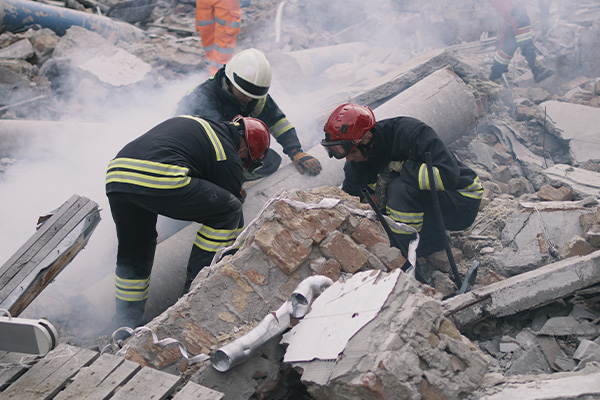Crisis Management
Serious accidents, deaths, suicide, armed conflicts, climate disasters… Many events can impact your employees and work organizations. To support you in these sensitive situations, EUTELMED offers a dedicated system, available worldwide, with the same level of quality.
Why entrust your crisis management to eutelmed?
Providing the same level of support to all employees, anywhere in the world.
Implementing the employer’s social responsibility. When employees feel supported, the bond of trust with the company is strengthened.
The company’s activities and missions will be less or not at all impacted in the short, medium, and long term.
OUR CRISIS MANAGEMENT PROTOCOL REFINED FOR OVER 13 YEARS
Activation
an experienced team available 24/7
Rapid and effective needs assessment
with a crisis coordinator, a psychologist – your unique point of contact who advises you on implementing solutions and managing crisis communication
Deployment and follow-up
with tailored solutions (individual, group, remote, on-site), in over 60 languages, communication tools, and a comprehensive activity report
Use case

EARTHQUAKE IN TURKEY
One of our clients, an international financial group, was directly affected by the earthquake in Turkey. Several teams were located at the earthquake site. Other teams, although based elsewhere in the world, had family members who were directly impacted in Turkey.
Actions deployed
In less than 24 hours, we mobilized a team of three Turkish-speaking psychologists to implement various support measures. First, a Turkish-speaking clinical psychologist from Eutelmed conducted a webinar on psychological first aid for all employees directly and indirectly affected by this natural disaster. The goal of this webinar was to inform participants about the psychological effects of exposure to a traumatic event and to provide techniques for mobilizing their protective resources and suitable coping strategies.
At the same time, proactive calls were made by our Turkish-speaking psychologists to affected employees to explain the support system available to them from their employer and to identify those needing additional individual support. For these individuals, we conducted in-depth one-on-one interviews over several weeks to accompany and support them through the various stages of post-traumatic stress.
Given the large number of people affected, for whom our psychologists detected particularly high levels of stress and anxiety, we also organized in-person support at their various sites. One of our local psychologists visited once a week to meet with those needing support, introduce themselves, communicate about the available support system, and supervise small group discussions.
Results of the intervention
![]() 90 individuals received support
90 individuals received support
![]() 539 individual interviews conducted
539 individual interviews conducted
![]() 2 languages used: Turkish and English
2 languages used: Turkish and English

100% of employees felt that the implementation of the support system was a positive and supportive action, even if some did not wish to or did not need to use the system. In fact, sometimes simply knowing that personalized and in-depth support is available, along with the sharing of educational information about mental health, tools, and resources to activate in response to a potentially traumatic event, is sufficient for many people. This generates psychological safety and recognition towards the company and the work environment, which is essential for regaining stability.

SUICIDE ON-SITE IN CANADA
Following the suicide of an employee at an international construction site, our client, an international contractor, requested that we implement specific support for the team and the Management.
Actions deployed
Employees were deeply affected by their colleague’s suicide. Since it was an international site in Canada, the teams were multicultural. We mobilized a team of psychologists who spoke French, Canadian French, English, Canadian English, Egyptian Arabic, Portuguese, Tamil, and Tagalog.
We first conducted proactive calls, which allowed us to identify individuals who needed additional support. These individuals received several one-on-one sessions with a clinical psychologist who spoke their language and understood their culture.
Eutelmed, through our project manager (a work psychologist) responsible for managing this crisis, also supported Management by anticipating the various stages of the crisis and providing appropriate communication tools. We notably offered to assist with the repatriation of the coffin, a symbolic act to ease the emotions associated with this difficult moment. Additionally, we advised Management on sustainable actions to implement, as the interviews revealed a significant feeling of isolation among employees.
Results of the intervention
![]() 14 individuals received support
14 individuals received support
![]() 14 proactive calls made
14 proactive calls made
![]() 38 individual interviews conducted
38 individual interviews conducted
![]() 6 languages used: Arabic, English, French, Portuguese, Tamil, and Tagalog
6 languages used: Arabic, English, French, Portuguese, Tamil, and Tagalog

100% of employees who benefited from the system found it to be positive and supportive. Our intervention concluded when the project manager and Eutelmed psychologists observed a calming effect on individuals and relief in being able to express and release their various emotions.

